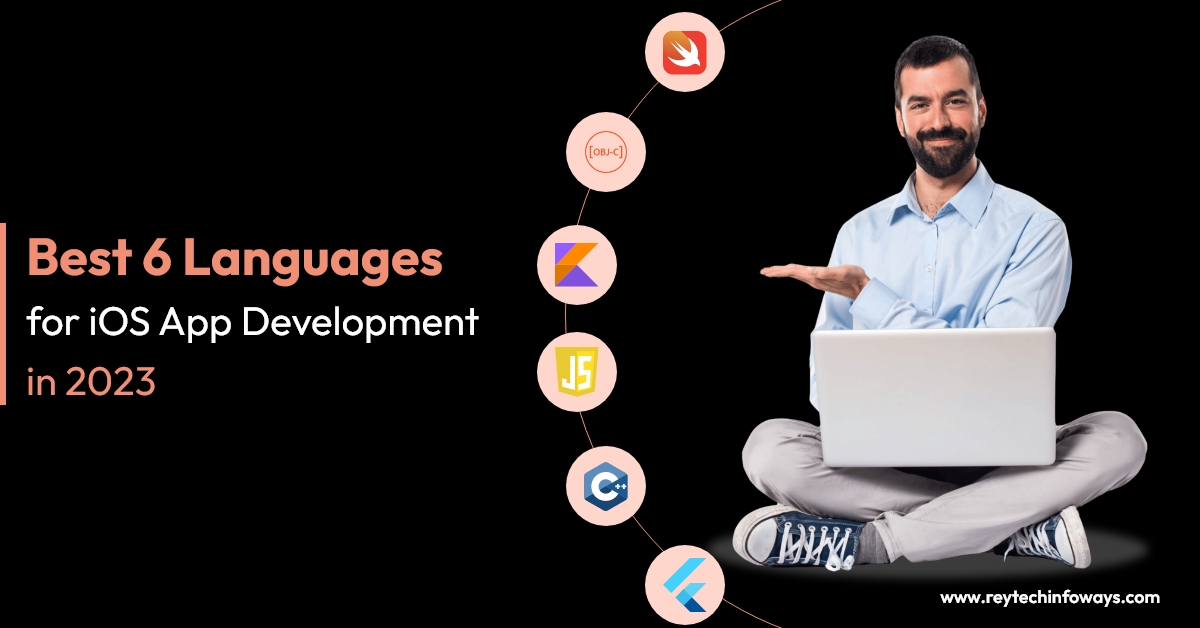Mobile App Development
Best 6 Languages for iOS App Development in 2023

Introduction
Top iOS development services are about creating mobile applications for Apple's iOS operating system, predominantly used on iPhones, iPads, and iPods. Developers use programming languages such as Swift or Objective-C and the Xcode integrated development background to build these apps.
iOS development permits the creation of a spectrum of applications, from games and social media platforms to productivity tools and more. Inventors typically follow Apple's Human Interface Guidelines to ensure a constant and user-friendly experience for iOS users.
The App Store is the immediate platform for broadcasting and selling iOS apps, and developers must stick to Apple's submission guidelines for consent. With a large and engaged user base, iOS development offers an effective opportunity for app developers to reach a wide audience and contribute to the mobile technology ecosystem.
Swift
iOS development concerns creating mobile apps for Apple's iOS system, used on devices like iPhones and iPads. Developers employ languages like Swift or Objective-C and the Xcode environment to build different apps, traversing games, social networks, and productivity tools.
Attaching to Apple's Human Interface Guidelines ensures a seamless user experience. Apps are mostly distributed and sold through the App Store, with strict adherence to compliance guidelines. iOS development offers vast possibilities due to its actual user base.
Swift, a pliable and user-friendly language, helps creators with Automatic Reference Counting, multiple return values, and type parameterization for error detection.
Objective-C
Objective-C, primarily developed by the Objectives Computing Corporation in the 1980s, desired to streamline programming. It stays an eminent choice for iOS app development companies, especially within the Apple ecosystem.
Objective-C employs a high-performance compiler with hardware acceleration, delivering faster execution compared to other structures. It enables cross-platform app development by sustaining C, C++, and Objective-C programming languages.
Notably, it splits the access to classes and methods from the programmer's syntax, improving clarity. Additionally, Objective-C is facilitative to scripting with automatic memory management features like garbage collection, and subsidizing data types controlled by garbage collection. This language persists to be favored for its versatility and efficiency in iOS development.
Kotlin
Kotlin, crafted by JetBrains and subsequently adopted by Google for Android app development, is increasingly infiltrating the realm of iOS app development. Through the invention of Kotlin Multiplatform Mobile (KMM), developers can create shared Kotlin code that seamlessly functions on both iOS and Android platforms.
This approach curtails monotony, streamlining code management and underrating duplication. Although KMM is in its budding stages, it offers a promising prospect as a flexible solution for cross-platform development in 2023.
Its power to bridge the gap between iOS and Android, while preserving code integrity, emphasizes its potential as a practical asset for developers seeking efficient cross-platform solutions.
JavaScript (React Native)
React Native, leveraging the JavaScript programming language, has garnered noteworthy attention within iOS app development for its outstanding cross-platform versatility. It facilitates developers to write code once and apply it to develop applications on both iOS and Android, simplifying the expansion process.
React Native revs app development with an expansive collection of pre-built components, promoting efficiency. Supported by a vibrant and corroborating community, React Native enjoys unremitting enhancements, making it an appealing option for those desiring efficient development and the capacity to target numerous platforms seamlessly.
Dart (Flutter)
Flutter, a Google-developed UI toolkit, leverages the Dart programming language to create natively compiled applications across mobile, web, and desktop platforms, all from a unified codebase.
While it differs from standard native iOS development, Flutter has garnered awareness among iOS developers due to its strong performance and the availability of customizable widgets for framing visually attractive and responsive applications.
A standout element is Flutter's "hot reload," which allows rapid iterations during the development procedure, making it particularly attractive for prototyping and efficient app creation. This versatility creates Flutter an enticing option for creators seeking a complete and streamlined approach to cross-platform application evolution.
C++ (C plus plus)
In circumstances demanding excellent performance and straightforward system-level access in iOS app development, C++ appears as a valuable selection. Specifically prevailing in domains such as game development and system-level programming, C++ presents developers with the power to optimize code for peak performance while preserving low-level control.
This versatile language's ability to efficiently handle memory and interact closely with hardware makes it a strategic option for formulating high-performance applications where gait and resource utilization are critical. In these specialized contexts, C++ proves to be a reliable and profitable choice, encouraging developers to harness the full prospect of iOS platforms.
Conclusion
The preference for a programming language hinges on the unique project demands and developer preferences, but Swift and Kotlin stand out as superior and favored choices for native iOS app development in 2023.
These languages are not only widely embraced but also frequently advised due to their suitability for crafting high-quality, efficient, and platform-specific iOS applications. Swift, with its modern syntax and safety segments, and Kotlin, with its cross-platform capacities through Kotlin Multiplatform Mobile (KMM), have earned a commendation for their ability to facilitate the development process and provide robust, performance-driven apps, causing them top contenders in the iOS development domain for the current year.